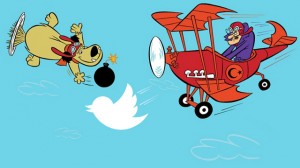
Welcome (almost) to 2017. If you're reading this, the Seventh Seal has not yet been broken, the cybers have not all fallen over, and you apparently have not been consigned to the kids' table by a disagreement with relatives about which bowl game to watch. Hooray for minor victories.
That means it's time for us to look forward to the year ahead and select the companies and technologies least likely to see its end.
"Deathwatch" is not a prediction of actual corporate demise—that sort of thing, as we've seen with past Deathwatch selectees, rarely happens quickly or completely. Most failing companies—and even many failed products—limp on in some way through acquisition, integration, inertia, or the eternal zombie life of bankruptcy protection. Instead, Deathwatch is a way of recognizing those entities in a different sort of mortal peril: technical, economic, and/or cultural irrelevance.
To be a candidate for the Deathwatch, a company or product division of a company should have experienced at least one of the following:
- An extended period of lost market share in their particular category
- An extended period of financial losses or a pattern of annual losses
- Serious management problems that raise questions about the business model or long-term strategy of the company or product line
Last year's class of losers
In 2016, we had six picks for Deathwatch: Yahoo, HTC, the BlackBerry OS, Groupon, Rdio, and Tidal. Four of our six picks did not make it to this year's list, for various reasons:
- Rdio was sort of a gimme, as the company was already cratering as we wrote our prediction—the streaming company had already sold off its business to Pandora.
- Tidal is still circling the drain after Jay-Z bought the company in 2015 for $56 million. The financials for the company are no longer public since Jay-Z took it private, but its books are widely reported to be in dire straits. In June, the Wall Street Journal reported that Apple was in talks to acquire Tidal, mostly for its relationship with artists—but it looks like that was just talk. We count Tidal as a wave that has broken.
- RIP BlackBerry OS. BlackBerry isn't really even in the handset business anymore. But that leaves the rest of the company… still on our list.
- Groupon and its competitor LivingSocial were both popular choices for last year's inclusion on Deathwatch. Groupon is losing money still, and its income was down by half compared to 2015—despite $4.4 billion in gross billings worldwide in the first nine months of 2016. But Alibaba has taken a stake in Groupon, and there are rumors that the China-based online retailer is considering an acquisition. For now, we've consigned Groupon to the spam bucket.
This year's Deathwatch was meticulously curated. After an ad-hoc process for candidate selection—including pleas for input from our secret cabal of Ars readers, editors, and covert operators—our Deathwatch electoral college scientifically assessed each nominated candidate. There was some heavy ballot stuffing for candidates like "the Environmental Protection Agency" and "the United States of America" in this year's reader balloting. We suspected voter fraud, so we threw all that out and just went with our gut.
This year, we've picked a magnificent seven companies for the Deathwatch. 2017's list includes two (well, three, sort of) returning champions and a whole bunch of new contenders. Let's kick things off by noting that it's a bad year for companies whose names start with "Y."
Yahoo!

Yahoo, the Internet portal for everything and the employer of MSM mainstays like Katie Couric and David Pogue, has been in "turnaround" for years—protected mainly by its big stake in Chinese e-commerce giant Alibaba. We put Yahoo on Deathwatch last year as the company contemplated selling off its actual businesses and remaining essentially a US Alibaba holding company—all profit, fewer people, the perfect vision of corporate capitalism.
Yahoo CEO Marissa Mayer's go-big-or-go-home plans to expand and conquer had failed, and it looked like Yahoo might be sold off piecemeal to various Internet bottom-feeders. Yahoo's big video plans were put in turnaround, there was a layoff of 15 percent of staff in February, and a discrimination lawsuit claimed that the "Media Org"—Yahoo's content machine—was biased in hiring against men.
Business-wise, 2016 has not been a good year for Yahoo, either. Thanks in part to the restructuring costs that came with layoffs, Yahoo's Internet business hemorrhaged money at twice its pace from last year—losing $709.2 million from business operations in the first nine months of the company's fiscal year. That was enough to make the company as a whole actually lose money for the first three quarters ($376.3 million), on $3.7 billion in revenue.
But things were looking up mid-year when along came a knight on a white horse… or rather, along came Verizon. Still digesting another 1990s Internet giant—AOL—Verizon was apparently enamored with Yahoo's mobile advertising platform and still hungry for more content. In June, Verizon made a $4.8 billion initial offer for Yahoo's Internet operations, planning to fold it into Tim Armstrong's AOL unit. (This editor's suggestions for the resulting media and mobile monolith included "Event Verizon" and "LOL OMG WTF.") For a while, it looked like everything in Yahoo-land would end not with a bang but with a soft burp.
That is, until Yahoo started telling everyone about those security problems. First, in September, came the news of a breach of over 500 million accounts' data in 2014, for which Yahoo blamed a "state-sponsored actor." Then, in October, Yahoo quietly slipped a comment about cookie hacking into a quarterly report, indicating that those same hackers had made off with code that allowed them to gain access to targeted users' accounts without a login.
Verizon suddenly got a lot less enthusiastic about its acquisition, and executives reportedly asked Yahoo to knock $1 billion off the deal's price after that news broke. But even after it was reported that some Yahoo employees had known about the 2014 breach shortly after it happened, AOL's Tim Armstrong said on December 6 that he was still "cautiously optimistic" about the completion of the deal.
But the shoes were not done dropping. On December 14, Yahoo's chief information security officer, Bob Lord, revealed that yet another data breach had been discovered. This one was revealed by information circulating in criminal marketplaces; turns out that more than one billion accounts' data had been breached in August 2013. There was no indication of who had obtained the data or how they had penetrated Yahoo's systems. But whoever hacked Yahoo three years ago had apparently decided to sell off the data now after the later breach prompted Yahoo users to change their passwords.
If Verizon/AOL does go through with its purchase of Yahoo, it's certain to be for a heavily discounted price. But there's an increasing chance that Verizon will instead opt to walk away, seeing the Yahoo brand as even more damaged goods than it was this time last year. Even if the deal does go through, the overlap with AOL's businesses is so substantial that there will undoubtedly be plenty of pink slips no matter what happens. Yahoo!?
—Sean Gallagher
Yik Yak

Unlike Facebook, which based its whole play on identity and "friends," Yik Yak was for networking on the down low—a location-based anonymous social networking service for passing secret asides, sort of like the un-dearly departed Secret app. And as it rapidly grew—soon becoming one of the top 10 downloaded apps—it also became a choice platform for campus hate speech and cyber-bullying, absorbing some of the viciousness that had plagued Secret (and that still plagues Twitter).
As a result, Yik Yak ended up being banned on some college campuses (like that would work). Then Yik Yak itself tried blocking abusive posts, giving moderators authority to delete downvoted messages, and ratting out especially threatening posters to the cops. Finally, this year, it ditched the anonymous part, forcing users to choose a unique "handle" by which they could be identified—first making these handles optional and then (in August) mandatory.
In no time, Yik Yak dropped off the app download charts. By November, Yik Yak said "lol just kidding" and turned anonymous posting back on.
On December 8, Yik Yak laid off 30 of its 50 employees, with no business model yet in sight. There's no word on which way Yik Yak will zig zag next, but we're betting it's not toward a middle-out compression algorithm.
—Sean Gallagher

Twitter isn't going to vaporize by the end of 2017. But rest assured, Twitter as we know it will not last through the year. And we're not talking about some sort of visual overhaul or slight feature tweak like the ones we’ve come to expect from major rivals like Facebook every year or so.
Twitter's continual bleeding of cash will have to come to an end, one way or another. While the company is losing less money than it has in the past ($289 million based on generally accepted accounting practices in the first nine months of 2016, compared to $430 million during the same period last year), Twitter is still hemorrhaging investors' money. And Twitter management's 2016 courtship of a few big potential buyers (including Disney) didn’t just fail—it crashed and burned.
Critics have railed against the platform for its inability to handle harassment and abuse. Twitter CEO Jack Dorsey has made a lot of public statements about this issue dating back over a year, but real change simply hasn’t come to the platform. As far back as this March’s SXSW Interactive expo, analysts pointed to sensible changes that could transform the platform’s core social-media experience, specifically in terms of curating and filtering personal feeds. Twitter hasn’t come close to implementing any of them.
By the time the company rolled out a “mute specific words” feature, it was too little, too late. The site's “egg” accounts and Pepe frogs have taken over, employing the same tactics used in 4chan-spawned movements to bombard and harass average users through a veil of anonymity and amplified hate speech. The platform’s most talked-about user, President-elect Donald Trump, has relied on the platform to spread misinformation and point his most harassing and abusive followers at specific people he dislikes.
Who the heck wants to buy that kind of site?
Young users are flocking to Snapchat in droves, which has aggressively bolstered its base experience with more insulated friend-list tools and a clever, video-driven news feed service. Ten seconds of video is the new 140 characters of text—yes, that’s 10 seconds, not 6. Twitter was built for an SMS world, and between the closure of Twitter-owned Vine and the inability of Twitter-owned Periscope to combat Snapchat’s growth, the company doesn’t seem poised to leave SMS behind in a successful way. Meanwhile, Twitter's acquisitions and NFL-related deals have bled more cash than they’ve earned.
It's likely that Twitter will be forced to sell itself at a huge discount (or sell off bits of its intellectual property) just to keep the site afloat through the end of 2017—or until its user base is folded into something else, though what that would be is much harder to predict. Also, expect Twitter to do something drastic as a last gasp to raise its public profile before such a sale closes. (If there’s a way to place a Vegas wager on Twitter deleting the @realDonaldTrump account at some point, put me down for $10.)
—Sam Machkovech
reader comments
355